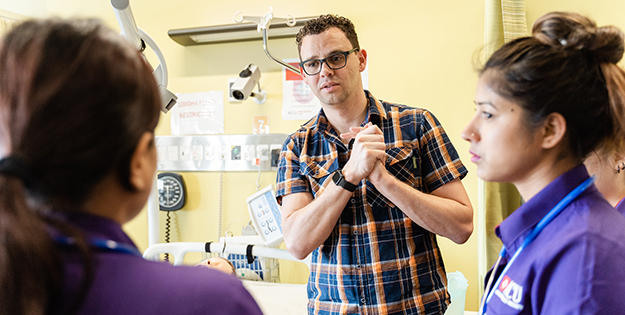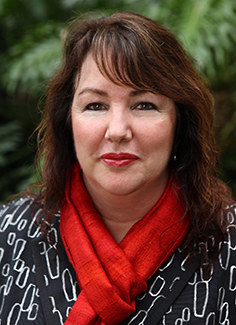Career
Copyright@ Australian Catholic University 1998-2026 | ABN 15 050 192 660 CRICOS registered provider: 00004G | PRV12008
Copyright@ Australian Catholic University 1998-2026 | ABN 15 050 192 660 CRICOS registered provider: 00004G | PRV12008

Complex and challenging, yet vital and rewarding. The common view of mental health nursing as an important but demanding job, where hardworking healthcare practitioners deal with testing and at times hostile situations, may contain a kernel of truth.
Yet it’s also true that there’s never been a greater need for mental health nurses, with one in five Australian adults experiencing a mental illness requiring mental healthcare in any given year.
The growing demand for mental health services can have flow-on effects on the individuals who make up the workforce.
“Mental health nurses identify high workloads, staff shortages, verbal and physical aggression and workplace bullying as some of the things that cause them stress, often impacting their own mental health,” says Professor Kim Foster, who heads the Mental Health Nursing Research Unit, a collaboration between NorthWestern Mental Health and Australian Catholic University (ACU).
“Nurses make up over 50 per cent of the mental health workforce, and if they’re experiencing high levels of workplace stress and the sources of stress are not reduced, and nurses are not well equipped to deal with stress, it raises serious concerns about the ongoing implications for the health and wellbeing of a group of people that we’re extremely reliant on.”
Kim Foster is one of Australia’s leading researchers in mental health nursing. In recent years, her work has focused on understanding the pressures on nurses in a mental health setting and how these can be reduced, as well as how nurses can be supported to manage challenging situations at work and build their resilience.
In order to understand the nature of stressors for this vital workforce, in 2020 she led a team of researchers to conduct Australia’s first large-scale survey investigating wellbeing and stress in mental health nurses.
The research, which involved almost 500 Victorian nurses and was published in the International Journal of Mental Health Nursing, found that high rates of ongoing stress had serious implications for both nurses and the industry more broadly.
The findings built on international research showing that many mental health nurses experience verbal and physical aggression at work.
“We’ve been aware that aggression occurs across all fields of healthcare for some time now, but this is one of the first studies to have data to demonstrate its prevalence in mental health nursing in Australia,” says Professor Foster, who supports the rollout of initiatives to reduce occupational violence, as well as strategies to improve staff wellbeing and resilience.
If the demand for mental healthcare continues to increase, and recruitment and retention doesn’t improve, there could be a shortage of almost 20,000 nurses by 2030.

The predicted shortfall has experts looking at ways to replenish the profession’s numbers before the situation reaches crisis point.
As well as these wide-scale implications, there is also the moral imperative to secure the wellbeing and safety of individuals in the nursing profession.
“Stress at work is a complex and common problem,” she adds, “and there are many reasons why it is a challenging issue to grapple with as there are a number of factors involved.”
She’s quick to point out, however, that not all mental health nurses struggle with excessive stress at work, and many are well-supported by the organisations they work in.
“Many mental health nurses are very happy in their work,” Professor Foster says. “They love their jobs and find the work very rewarding and are well-prepared to deal with the stresses they face — but we can’t pretend that there aren’t any problems either.”
Nurses working in acute mental health wards often talk about the balance between rewards and challenges. Take this anonymous account, which depicts a demanding job that is, at the same time, emotionally gratifying.
“My job can be beautiful and wonderful and so rewarding. Some days I leave work and my face hurts from smiling … I get to save lives and make a difference, no matter how small that difference may be and I am so fortunate to be able to do that.”
So how does one thrive in a working environment where adversity is expected? Where workplace stress may affect nurses’ psychological wellbeing and lead to anxiety, fatigue and burnout?
One of the answers, says Professor Foster, is to understand the causes of stress and for organisations to have targeted strategies to reduce them. Alongside this, it is also important to support mental health nurses with strategies that allow them to cultivate and develop resilience before they start working in the field.
“Resilience is a process of positively adapting to stress and adversity and involves building people’s own skills and strategies as well as ensuring there are resources in their environment to help them,” says Professor Foster, who is currently leading an Australian Research Council (ARC) Linkage Project to promote resilience in mental health nurses.

“The idea is that building resilience is a proactive and preventative approach— not an intervention after an event. It’s about equipping nurses with the strategies to support themselves in their daily work and when they’re in high-stress settings, so that they are better equipped to overcome difficult situations if and when they arise.”
While resilience programs are known to reduce the negative psychological impacts of workplace stress in the general population, more research is needed to examine their impact on mental health nurses.
Professor Foster says her ARC Linkage Project, which includes a large-scale trial of a workplace resilience program with nurses at NorthWestern Mental Health, is a world-first in mental health nursing.
The project will compare outcomes for nurses who participate in the program with a group of nurses who do not, and evaluate how the program can best be implemented in a large mental health service. It involves researchers from NorthWestern Mental Health/ACU and three other universities, and is supported by key unions (Australian Nursing and Midwifery Federation, and Health and Community Services Union) and government partners (Department of Health and Human Services, Victoria).
“It is a huge partnership where all parties have agreed that we need to try to implement positive and strengths-based interventions to support the wellbeing of the mental health nursing workforce,” says Professor Foster, who notes that is particularly important for younger and less experienced mental health nurses, who can experience high levels of stress.
Cultivating resilience in nurses will not only have benefits for patients and the nurses themselves – it could also help to avoid a looming mental health nursing workforce crisis in Australia.
“This is a specialty area of nursing that is extremely important, with nurses who are working in a vital but often under-valued field of healthcare in our society… we need to do more to ensure we’re giving them the tools they need to manage their wellbeing, the stresses of the job, and the daily challenges they’ll face in their working lives.”
Kim Foster is an internationally recognised mental health nurse academic, researcher and educator and is widely published. She is a Professor of Mental Health Nursing at Northwestern Mental Health and ACU, where she leads the Mental Health Nursing Research Unit.

Interested in starting or advancing your career in nursing? Discover your options.
Copyright@ Australian Catholic University 1998-2026 | ABN 15 050 192 660 CRICOS registered provider: 00004G | PRV12008